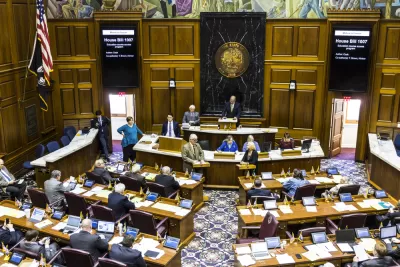Just past midnight on Saturday morning, the Indiana State Senate passed the transportation plan after the Housed approved it Friday. It also passed a $32 billion, two-year state budget bill, then adjourned for the year, one week ahead of schedule.

The last time the state of Indiana's 18-cents-per-gallon gasoline excise tax was increased was 2003. The total tax, which includes a monthly variable gasoline use tax rate of over 13 cents-per-gallon that goes to the state general fund, plus 1 cpg inspection fee, was 32.84 cents per gallon as of April 1, according to the American Petroleum Institute.
Capturing the successful close of the 2017 legislative session was Mike Perleberg of Eagle Country.
“This session’s historic, transforming achievements include the passage of the largest state and local infrastructure investment in Indiana’s history and a structurally balanced state budget,” said House Speaker Brian Bosma (R-Indianapolis).
The transportation plan will pump an average of $1.2 billion in new money annually into road infrastructure beginning in 2024. About $850 million of that yearly amount would be designated by state highways while local roads would receive about $350 million.
The 10-cent gasoline excise tax will be phased-in: 5-cents on July 1 of this year, and 5-cents on July 1, 2018. House Bill 1002 by Rep. Edmond Soliday, has the support of Gov. Eric J. Holcomb, the former lieutenant governor who was elected as governor after he replaced now-Vice President Mike Pence on the November ballot.
According to Kaitlin L Lange and Tony Cook of The Indianapolis Star on Thursday, a major issue of the legislation was the gasoline use tax on fuel, whether it should be diverted to road programs from the state General Fund
The House pushed for all of the gas sales tax money to be shifted to roads even before this legislative session, but the Senate was reluctant.
The compromise was to split the funding between local roads and bridges, state highway, and the General Fund until state fiscal year 2025, when all funds go to roads. Total loss to the state would be $350 million per year, according to Lange and Cook.
Other significant parts of the bill include:
- Increasing the diesel (or "special") excise fuel tax rate, now 16 cpg, and motor carrier tax, now 11 cpg, by ten cents per gallon but eliminating the state 7 percent sales tax on diesel fuel.
- Indexing fuel tax rates until July 1, 2024. Annual increases are capped at one-cent-per-gallon.
- Adding a $15 motor vehicle registration fee.
- Adding an annual electric vehicle fee of $150 (similar to the California and Tennessee legislation that passed earlier), adjusted every 5 years for inflation.
- Adding an annual hybrid vehicle fee of $50, adjusted every 5 years for inflation.
- Requiring the Indiana Department of Transportation to seek a Federal Highway Administration waiver to toll interstate highways, described in greater detail in a February post.
- On other roads, it "gives the governor the power to add tolls, if approved by the State Budget Committee," according to Neil Abt of Fleet Owner.
Abt adds that the Tennessee bill must return to the House "due to non-transportation-related changes the Senate added to its version." He also notes that South Carolina and Minnesota are debating gas tax increases, while the Colorado legislature struggles to pass a bill to allow for a plebiscite to increase the state sales tax to fund transportation projects.
FULL STORY: Lawmakers Pass Budget, Road Funding, Gas Tax Increase As Session Comes To A Close

Planetizen Federal Action Tracker
A weekly monitor of how Trump’s orders and actions are impacting planners and planning in America.

Map: Where Senate Republicans Want to Sell Your Public Lands
For public land advocates, the Senate Republicans’ proposal to sell millions of acres of public land in the West is “the biggest fight of their careers.”

Restaurant Patios Were a Pandemic Win — Why Were They so Hard to Keep?
Social distancing requirements and changes in travel patterns prompted cities to pilot new uses for street and sidewalk space. Then it got complicated.

Platform Pilsner: Vancouver Transit Agency Releases... a Beer?
TransLink will receive a portion of every sale of the four-pack.

Toronto Weighs Cheaper Transit, Parking Hikes for Major Events
Special event rates would take effect during large festivals, sports games and concerts to ‘discourage driving, manage congestion and free up space for transit.”

Berlin to Consider Car-Free Zone Larger Than Manhattan
The area bound by the 22-mile Ringbahn would still allow 12 uses of a private automobile per year per person, and several other exemptions.
Urban Design for Planners 1: Software Tools
This six-course series explores essential urban design concepts using open source software and equips planners with the tools they need to participate fully in the urban design process.
Planning for Universal Design
Learn the tools for implementing Universal Design in planning regulations.
Heyer Gruel & Associates PA
JM Goldson LLC
Custer County Colorado
City of Camden Redevelopment Agency
City of Astoria
Transportation Research & Education Center (TREC) at Portland State University
Camden Redevelopment Agency
City of Claremont
Municipality of Princeton (NJ)




























